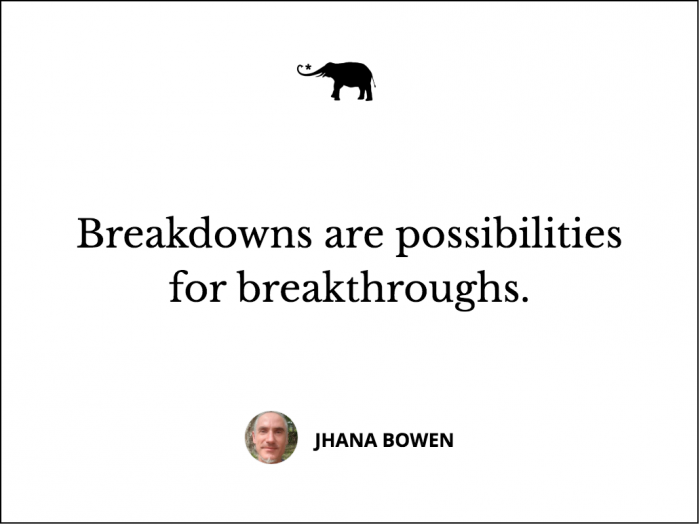
“Leap of Faith number 4,” oil on canvas
At times, I imagine everyone but me has their lives figured out.
The rich, the vibrant, the healthy, and the beautiful. Maybe, I wonder, am I the only one in a glorious, stupid, messed up bundle of angst and dysfunction? The pain that surfaces seems so personal. So close to home.
Yet, when I dig beneath the surface, I sense my mind messing with me. Wanting me to believe everything is personal. I feel the wool being pulled over my eyes—dramatising I’m some isolated fragment, divided from the whole.
I’m curious. How has this evolved? Though there’s pain, I’m not broken. I’m actually blessed, in so many ways. I have a roof over my head. I eat really well. I have all the clothes I need, a great bed, a modern car. I have running clean water and live in a peaceful country town.
Yes, I’ve had a fair share of tragedy, loss, and heartache. Yet, this comes with being human. There is a blessing in all of this.
I recall a time when I sat at the edge of a cliff, contemplating ending my life. Tears streamed down my face as I realised I needed to embrace the pain rather than try escaping it all.
That helped because I chose life that day.
I continue to choose life. In each and every breath, I make that choice. With all the prevailing uncertainties, life is still worth every minutiae.
In all honesty, I know I am growing in the best way I possibly can. My body and mind serve me. They support me. I am the hero of this journey. I reflect that my environment did its best to provide the nurturing I needed as a child, though it wasn’t perfect. It wasn’t my mum and dad’s fault. Though I spent a good portion of my life blaming them, blame never served me.
No shortcoming was ever anyone’s fault. They are simply the result of an intergenerational pain. Pain that is unavoidable. I do my best to embrace it all with the fullness of my being. With a willingness to let all of humanity be as it is.
I learned, just like so many others, to avoid the fullness and depth of feeling. It was all I knew because my parents and caregivers hadn’t learned to welcome their own fullness and depth. So I once avoided communicating what was in my heart in an effort to receive the full depth and breadth of affection and love.
Without the expression of my natural self, I began to dissociate from my body and all the messages it offered. I learned to distrust my body’s guidance systems just so I could be accepted.
The underlying message communicated by my environment was that affection and love are transactional. I did the best I could do; I adapted. Mistakenly, I learned that my natural self was unacceptable, so I hid it away. I presented only what was celebrated and withdrew what was deemed as unwanted and unloveable.
Inevitably, I’d get triggered when these parts of me surface. These expressions of my natural self would cause a breakdown.
Such natural expressions can be grief, anger, desire, attachment, repulsion, and many others—simple human responses to life experiences. Yet, when these expressions are shut down, denial can cause breakdown. A barrier between our natural self and the persona can form to protect healthy expression of life’s impulses.
This is how adaptive identities/personas can form to protect parts of ourselves that weren’t affirmed during our developmental years. This can be where our natural expression of who we are gets covered up.
At the point of breakdown, there is an opportunity to allow our natural self’s healthy expression. We can do this by witnessing any identities and behaviours that we routinely fall into when we are triggered.
Breakdowns are possibilities for breakthroughs. They can reveal who we are beneath our habitual identities that try to make up for a lack of support for the natural expression of our natural selves that we didn’t get during our developmental years by our parents and caregivers.
What not Implicitly Trusting Life can Look Like
>> Feeling as though you’re unlovable, unworthy, or unnecessary.
>> Overcompensating for environmental deficits.
>> Interpreting mental, emotional, and physical challenges as personal problems.
>> Avoiding intimate, social, and family relationships.
>> Experiencing things as though they are frequently personal.
>> Avoiding taking healthy risks where opportunities present themselves.
>> Avoiding support where it’s available.
>> An unwillingness to give openly without condition.
>> A tendency to assume lack and scarcity.
>> An avoidance of confrontations that could resolve challenges and problems.
>> Continuing with destructive behaviours even when knowing they’re an issue.
Keys to Recovering Implicit Trust
>> Know that trusting yourself is an intuitive process.
>> Intuition supports you and only wants what’s best for you, so trust it.
>> Be prepared to make mistakes; this is part of the process.
>> Honing your intuitive guidance system by listening to its wisdom requires trust.
>> Be in it for the long run; you can’t go wrong.
>> Implicit trust cannot hurt you; going against it is the biggest problem.
>> Following intuition develops confidence, though it’s uncomfortable at first.
>> Implicit trust requires practice. Remember you’re not alone in this, broaden your horizon, and reach out for support.
>> Developing implicit trust is the foundation stone for transformation and growth on every level.
>> Intuition re-wilds your body and nervous system. So let go and let your natural self have room to come alive.
>> Let go of attachments to preconceived outcomes. If you have an outcome you don’t want to let go of, you hinder your capabilities to receive information that serves the highest good of all.
>> Implicit trust requires equipoise—embrace your life with a relaxed, attentive, and calm presence.
>> Practice the art of listening. In indigenous cultures, deep listening remains a sacred activity. In fact, it is a state of being in which your body listens to life.
>> Explore dreamwork. Dreamwork accesses wisdom of the subconscious, which supports healing and evolution.
>> Regularly clear your body, mind, and emotions.
>> Prompt your subconscious to become your ally.
>> As you receive messages from your intuition, take action. This is imperative. Even if it is challenging, change is the agent of your empowerment.
>> Implicit trust is the knowing that you have everything to gain and nothing to lose.
Implicit trust activates a remembrance of bodily intuition. A natural way to support yourself and the world around you.
Implicit trust is a sacred and courageous act. It is an innate and natural part of our heritage. As children, we are born with a trust that is natural and instinctual. This kind of trust helps to protect and support health. It nourishes and supports a holistic development of well-rounded individuals.
As we explore implicit trust, we gain access to our natural self, all the signals and cues thus provided. Such signals and cues can at times involve pain. If this is the case, it is important not to avoid this, especially that it can be uncomfortable. When we no longer avoid how life shows up, bliss invariably results.
Implicit trust is the act of unwaveringly following through on our bodies’ intelligent guidance system. A system that only has our best interests at heart. How can we know if these systems have our best interests at heart? Because intuition, body, breath, and the subconscious are a part of a greater community working in total cohesion and symphysis with all of life.
This kind of trust is life-affirming. It’s what is most needed in times when so many people are conditioned to go against their health and trust—when fear, doubt, and greed are so prevalent in society and there are those who prompt us out of our basic trust and intuition. This is false information.
We can always contact the truth from within ourselves. We can always listen with the body. There is a power that is always available that helps us navigate through anything.
We can literally change the world we live in from within.
~









Read 3 comments and reply